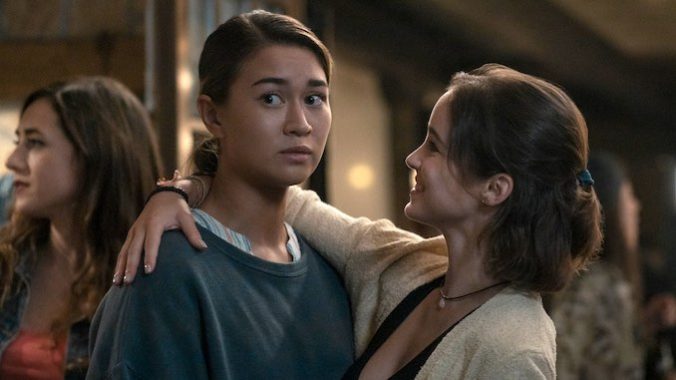Through Ava and Beatrice’s Love Story, Warrior Nun Finally Delivers Sapphic Catharsis
Photo Courtesy of Netflix

During what has been a tumultuous year for queer audiences, it’s nice to finally get a win. In the newly released second season of Netflix’s Warrior Nun, fans’ dreams have finally come true with the events of Season 2’s finale, “Jeremiah 29:13.” Ava (Alba Baptista) and Beatrice (Kristina Tonteri-Young) are in love, and have canonically cemented their relationship with a kiss.
In the episode, Ava makes the decision to sacrifice herself for the greater good, as she believes is the Warrior Nun’s duty. Despite Beatrice’s protesting, Ava’s mind is made up, but she doesn’t leave without kissing Beatrice for the first time. After a tender forehead kiss and a heartfelt goodbye, Ava phases through the floor to find the stolen Arc. Later in the episode (after fighting an entire army of crazed zealots), Beatrice finds Ava mortally wounded, and is forced to send her through the portal to the Other Side to heal from her fatal wounds. Ava’s last words are her love confession to Beatrice, who responds after Ava has already passed through.
While this may seem like a run-of-the-mill revelation (especially after Season 1’s subtle teases), sapphic viewers recognize Ava and Beatrice’s canon-status as a specific type of vindication, one that offers a hopeful first step in making up for years of being burned by shows past. Those burns have come in various forms over the years, but most notably in the form of queerbait, which can be defined as a method of television writing that leaves a relationship between two characters of the same sex constantly floating in the grey area between an actual canonical couple and just a good pair of friends. The motivation behind these unclear dynamics is to string queer viewers along, while still maintaining an air of plausible deniability for their straight audiences.
These situations often contain greatest hits like: two female characters declaring their undying devotion to one another before promptly calling each other their “sister” or “best friend” (like Hope and Josie in Legacies); a male character stepping in to be the buffer between two female characters, while still continuing the deep relationship between the women (like James Olsen becoming Lena Luthor’s boyfriend in Supergirl’s third season); or an undercurrent of a much deeper relationship that continually gets brushed off by the show’s established canon (like the dynamic between Dean and Castiel on Supernatural).
Warrior Nun’s second season actually hits all the classics listed above: Ava and Beatrice constantly refer to themselves as “best friends” and “sisters” throughout the season, find a man placed in the middle of their dynamic through Michael’s reintroduction, and share many weighted moments throughout Season 2. The difference comes from the show’s commitment to this relationship, allowing all of those once-baity moments to be recontextualized as not just a figment of queer fans’ imaginations, but part of the show’s canonical text. Through the centering of Ava and Beatrice’s relationship as one of the core conflicts (especially as they dance around one another, share in feelings of jealousy, and prioritize each other over the mission), Warrior Nun cemented its commitment to its queer characters—and its queer audience—before they ever lock lips.
In particular, Beatrice’s journey of discovering her love for Ava, especially shown through the lens of her own struggle with self-hatred and duty, shines during Season 2. One example is the perfect call-back to Beatrice’s emotional coming out scene from Season 1, Episode 8 that comes in Season 2’s fourth episode. In her original coming out scene, Beatrice admits her struggles with self-loathing and her religious identity. Ava responds, “Don’t hate what you are. What you are is beautiful.” In Season 2, Beatrice hallucinates an evil version of Ava while wandering through Adriel’s fear-inducing fog—a version that smirks at her and screams, “I know what you are.” In that scene, Warrior Nun uses Beatrice’s own fears and reservations about her deep feelings for Ava to elevate the horrors of series villain Adriel’s influence, while also furthering the dynamic relationship between the two women.
-

-

-

-

- Curated Home Page Articles By Test Admin October 21, 2025 | 3:10pm
-

- Curated Home Page Articles By Test Admin October 21, 2025 | 2:57pm
- Urls By Test Admin October 21, 2025 | 2:57pm
- Curated Home Page Articles By Test Admin October 21, 2025 | 2:55pm
-

-

-

-

-

-

-

-

-

-

-

-

-

-

-

-

-

-

-

-

-

-

-

-

-

-

-

-

-

-

-




































